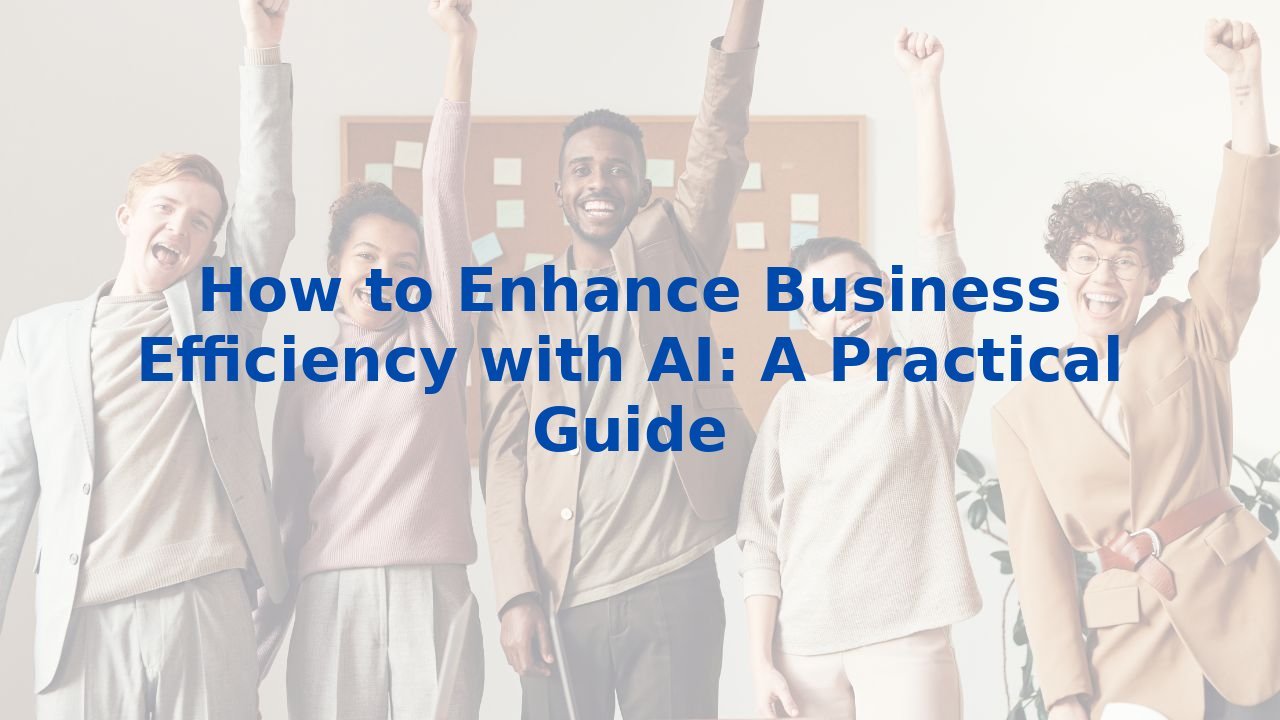How to Enhance Business Efficiency with AI: A Practical Guide
How to Enhance Business Efficiency with AI: A Practical Guide
In a world that thrives on innovation and speed, the quest for efficiency within business operations has never been more crucial. Organizations that harness the transformative power of Artificial Intelligence (AI) stand at the forefront of this revolution. AI is not just a buzzword; it represents a profound shift in how businesses approach workflow, decision-making, and customer interaction. This guide explores the multifaceted ways AI can enhance business processes and the vital role of employee training in unlocking its potential.
1. Automation of Routine Tasks
Every organization grapples with the burden of routine tasks that consume valuable time and resources. The beauty of AI lies in its ability to automate these mundane processes. From data entry to bookkeeping, AI can handle administrative responsibilities with enhanced precision and speed. This automation not only alleviates human workloads but also greatly reduces the risk of errors, ensuring that data remains accurate and reliable.
When employees are freed from these repetitive tasks, they can focus on strategic and creative initiatives that drive growth. The result is a more engaged workforce, empowered to tackle higher-value responsibilities.
2. Enhanced Decision-Making
The ability to parse through vast amounts of data and extract actionable insights is where AI truly shines. Traditional decision-making processes can be limited by the volume of information at hand, often resulting in oversight or delayed reactions to market shifts. By integrating AI into these processes, businesses can leverage predictive analytics to forecast sales, identify emerging trends, and optimize supply chains in real-time.
In this data-rich environment, informed decision-making becomes effortless, allowing organizations to make proactive choices that positively impact their bottom line.
3. Personalized Customer Experiences
In an age where customers demand personalized interactions, AI emerges as a game-changer. By analyzing customer data and behavior patterns, businesses can tailor their offerings to meet specific needs and preferences. This level of personalization enhances customer satisfaction and fosters loyalty, key components in maintaining a competitive edge.
The rise of AI-powered chatbots exemplifies this shift, providing 24/7 customer support and streamlining the query-resolution process. By satisfying customer needs with speed and accuracy, businesses can enrich their brand reputations and drive repeat business.
4. Efficient Communication
Communication is the backbone of any organization, and AI plays a pivotal role in enhancing the flow of information. AI-driven tools can automate routine communications, generate swift reports, and create documents with minimal effort. When communication tasks are streamlined, teams can save precious time and focus on collaboration and strategy.
Ultimately, this efficiency leads to a workplace culture that values clarity and responsiveness, empowering teams to achieve their goals more effectively.
5. Training and Development
While automation is a powerful asset, it's essential to recognize that AI systems are not self-sufficient. To truly reap the benefits of AI, organizations must invest in training their employees. Understanding how to operate AI tools and interpret AI-generated data is crucial for success.
By equipping employees with the knowledge needed to engage effectively with AI, businesses can ensure these systems align with organizational goals and produce optimal results. Investing in AI training leads to a workforce that is not just technology-literate, but also equipped to harness AI’s full potential for continuous improvement.
Benefits of AI Training
Through targeted training, organizations can unlock numerous advantages:
- Improved Efficiency: Employees who understand how to use AI effectively can streamline processes, dedicating more time to high-value tasks.
- Enhanced Decision-Making: Trained employees are better positioned to interpret complex data and make informed decisions.
- Increased Productivity: Proficient use of AI tools can result in a higher output of work.
- Better Integration: A well-trained staff ensures that AI systems integrate smoothly into existing workflows, minimizing disruption.
Conclusion
The integration of AI into business processes is not merely a trend — it’s a foundational shift that enhances efficiency and enhances growth opportunities. From automating mundane tasks to supporting complex decision-making, the impact of AI on business operations is transformative. However, to maximize these benefits, organizations must prioritize employee training, allowing their teams to engage effectively with AI technologies.
By fostering an environment that embraces AI and equips employees with the necessary skills, businesses can navigate the future landscape with confidence, setting the stage for sustained success and innovation.
For organizations ready to embark on this journey of digital transformation, investing in AI training programs can be a vital next step. Unlock the potential of your workforce and harness the capabilities of AI to drive efficiency and growth.



